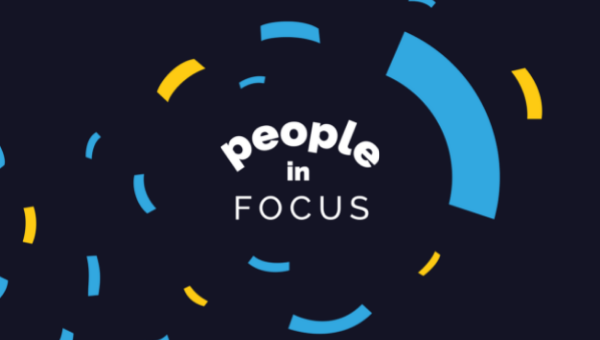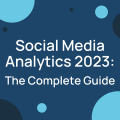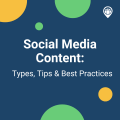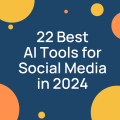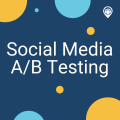People in Focus: David Glenwright
Team Locowise posted on 7 July 2021

Welcome to People in Focus, our new series of Q&As shining the spotlight on industry experts in social media. We’re delighted to announce David Glenwright, Head of Training at JC Social Media, as our first guest. You can read the full Q&A below, or download a PDF version here.
- Tell us a bit about your journey of working in social media.
I’ve been working in social media throughout my entire professional career, though it wasn’t the most obvious career path for me as I finished university. I have a degree in War Studies, but whilst I was a student I was actively involved with my student union as a course rep. This led to me using Twitter a lot as a transparency and engagement tool, just as it was starting to be taken seriously as a mainstream communications channel.
When I finished university in 2012 I came across an opportunity to be a social media account manager for an agency, and decided to give it a go, and I haven’t looked back since! Over the years I’ve worked for agencies, in-house as a social media manager and even freelance. For the past 6 years, I’ve turned my focus away from managing accounts to supporting others as a trainer – running workshops and sharing my experiences to help marketers get the most out of their channels.
- What are the main changes in social media you’ve noticed since the start of your career?
The social media environment that I work in today is unrecognisable to the world that I started in back in 2012, and that’s what makes this such an exciting industry to be part of. When I first started, Twitter was the dominant platform for the vast majority of brands and is what I spent most of my time on. Instagram was this new platform that a huge part of the population couldn’t even access (Instagram wasn’t available on Blackberry devices!); and MySpace was rolling out a brand-new look after being purchased by Justin Timberlake!
The introduction of Stories content over the last few years has been fascinating, and it has marked a dramatic shift towards more reactive and conversational styles of engaging with audiences. However, the most significant change that I’ve witnessed over the course of my career has been the rise of paid advertising on these platforms. When I first started, paid advertising was something only really done by big brands, and smaller businesses were thriving purely through organic engagement. Attitudes have shifted dramatically over the last 10 years, and this is reflected in the amount spent on ads: In 2012 Facebook generated just over $5 billion, a fraction of the $84 billion that they generated in 2020.
- What is a typical day like for you in your role?
I’m not sure there really is a typical day for me, and that’s what makes being a social media trainer such an exciting role! If it is a day where I’m delivering training, the first job is always to check my notes and make sure that everything is set for the session. I’ll also have a final look at the client’s social media feeds to make sure I’m up to date on what they’ve been up to. If the client has told me who is going to be in the session, I’ll also have a quick look at their LinkedIn profiles to get a feel for how comfortable they are in using social media.
Then, it’s on with the delivery of the session! I like to keep my sessions fairly relaxed and informal – questions are welcome at any stage, and I’m happy to let participants have discussions amongst themselves to apply what I’ve taught them to what they’re working on. Effective training is about communication – knowing what participants are understanding, and taking the time to carefully talk through things they might be struggling with. Once the session is over, I’ll make sure any recordings or resources are sent over to the client right away, and that they know I’m available if they have any follow-up questions.
Days where I’m not delivering sessions are usually spent preparing for the next client, researching who they are and what they’ve done on social before, so I know exactly what we’ll need to focus on in the session. I’ll also spend some time calling past clients to check in, see how things are going, and see if there’s anything else I can do to help them implement their new social media strategies.
- Which part of your role do you enjoy the most?
I absolutely adore discovering new businesses and meeting the people behind them. I don’t specialise in any particular industry, and that means I never know what kind of organisation I’m going to be with next. It might be a school, a recruitment company, a restaurant or an industrial component manufacturer – you never know!
What’s really fascinating about this all though is how transferable a lot of the skills I train are. Sometimes, a client that I’m with will mention a particular challenge, and I’m reminded of a past client who had a similar issue, even though they’re in a completely different industry. This means that I’m constantly learning, gaining new insights and discovering new ways to tackle problems.
- What are the different challenges you’ve faced in your roles?
Being a trainer, I don’t spend a huge amount of time with a client before our session together. I’ll always do my research and have a pre-training call, but the reality is that when I start working with a client, I don’t know the business as well as the people that I’m training. Ideas and approaches that I suggest may not actually work for that particular client, and that’s absolutely ok – it’s just important that I recognise when something isn’t going to work, and suggest an alternative that will.
The biggest challenge without a doubt however is keeping up with the changes that are constantly being made to the social media platforms themselves. Once, I was delivering a LinkedIn profile optimisation workshop to a group of business owners, and about half an hour into the session I discovered that LinkedIn had rolled out a radical redesign of the platform! About a third of the people in the session had this new version of LinkedIn that I had never seen before, and so I had to learn how to use the new layout as we went through the training. The social networks do like to keep us on our toes!
- What do you see as essential to achieve success in social media?
For me, the key to a successful presence on social media is to stop thinking about it as a traditional marketing channel. Often, marketing is about creating a touchpoint between your brand and your target audience, and using that touch point to convey important information and generate interest in your brand. On social media however, the process can be slower and more involved.
Social media is about relationships, it always has been. The early platforms like Friends Reunited and Beebo were designed to allow users to digitise their existing social circles and continue those relationships online. In a way, that is still what social media is to the vast majority of users. The difference today is that as businesses, we have the opportunity to infiltrate and be part of these circles. It’s important to respect that fact, and engage with audiences in a meaningful way that they benefit from. Once you achieve that, success on social media will come naturally.
- What is the greatest barrier or challenge facing the development of social media?
Over the past few years, social media platforms have been at the centre of conversations around how data is handled online and internationally, the spreading of misinformation and the impact of what we see online on our mental health. As these platforms grow and expand around the world, these issues become more complex as you try to find a solution that will work on an international stage. Some solutions have been proposed recently, but there are challenges that will remain for some time, that may impact the trust that users have in the platforms moving forwards.
These debates will undoubtedly go on, but in the meantime it’s important that brands continue to take ownership and responsibility for their content and their actions online. Transparency is a key objective for most social networks, and any brands who attempt to deceive their audiences online will get caught out. Honesty really is the best policy right now.
- If you had to choose just one social media channel to use, which would you choose and why?
Even though I no longer use it, I do have a sweet spot for MySpace, but if I could just use one social channel, it would have to be Facebook. I love that I can discover beautiful images and great content on Instagram; LinkedIn is a fantastic asset for my professional networking; and Twitter is my go-to for finding out what’s happening in the world. But Facebook is, in a way, able to do all of these things and more.
I often describe Facebook as the ‘home’ network, or the default social media platform. It is a space where you can easily engage with friends and family in private spaces; you can research companies and find out what others have to say about them; or you can just discover entertaining videos to keep you occupied for ten minutes. It’s the most versatile of platforms there is, a social network for all occasions.
- What tools do you rely on to fulfill your role?
Every client that I work with has different needs and requirements, so I’ve built up a significant library of tools and software over the years. Most importantly however is a decent mobile phone. I’ve Google Nexus and Pixel phones for as long as I can remember: they have great cameras for creating social content on the go, long battery life and a nice big screen to make it easy to demonstrate things to clients.
Go-to apps on my phone include: Facebook’s Business Suite app to help manage multiple pages on the move; the image editing tool Snapseed, which is like a streamlined, easy-to-use version of Photoshop; and Mojo, which has on more than one occasion been a lifesaver when you need to create engaging Stories content quickly.
On my laptop I’m trying out new tools and apps all the time to make my life easier and to find new insights. One that I have stuck with for some time now though is Calendly. This tool integrates with your calendar and means you can send clients a link that will let them see when you’re available, and book an appointment directly in your diary. If the meeting is going to be remote it will automatically create a Zoom link, and it handles time zone differences for you – an absolute lifesaver!
- What would be the most important piece of advice you’d give to someone starting their career in social media?
There is not a single right way to do it. Some people have marketing degrees and qualifications, and others come into the industry with no prior experience at all, and that’s what makes the industry so exciting. In the grand scheme of things, social media is still very much in its infancy – platforms are being developed and evolved based on the requirements of the users, including those who manage business pages.
In other words, social media is being defined by those who work in it right now. It’s not perfect, things go wrong, but we all share in these experiences and know that there are going to be exciting opportunities ahead. Keeping calm, not stressing about every little detail, and reminding yourself that you’re a pioneer – that’s how you have a great time working in social media.
- What is your favourite book?
Daniel Priestley’s Oversubsribed is a great book that helps you to really start thinking about how and why people buy. It isn’t necessarily specifically about social media, but the lessons that you can draw out of it and apply to social platforms are powerful, and will make a real difference to how you create content.
Instagram Rules by Jodie Cook is a brilliant book to have by your side when you’re stuck for ideas. Admittedly I’m slightly biased as I did contribute a couple of ideas towards it, but the book has over 125 different technique tips and ideas to help you think about and plan new content when you’re going through a creative dry spell.
If numbers, trends and insights are your thing, then you absolutely need to spend some time looking through Facebook IQ. This platform is bursting with data, insights, analysis and perspectives around the world, looking at how different industries perform, and how audiences react. It’s particularly useful if you need data to back up you campaign pitch!
- Do you have a favourite quote?
I draw on my War Studies background for my favourite quote from Dwight D. Eisenhower:
In preparing for battle I have always found that plans are useless, but planning is indispensable.
It’s an important reminder that with any marketing campaign that you run, the likelihood of everything unfolding exactly as you predict is slim. Having the flexibility in your plan to adapt to what happens is vital, and helps to ensure campaigns stay powerful and relevant.
- Who would you miss the most on Linkedin if they left the platform?
I have so many connections on LinkedIn these days that I think I’d struggle to notice for a while if someone left the platform! In a way that’s what I love about the platform, I’m constantly discovering and reengaging with amazing people with great businesses – it’s an exciting environment to be part of!
I do still miss Myspace Tom, but then again who doesn’t?
If you’d like to be considered for your next feature, please get in touch with us.
